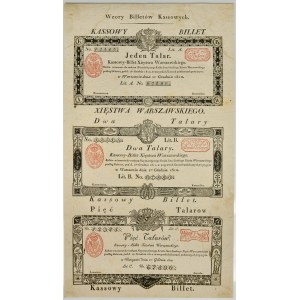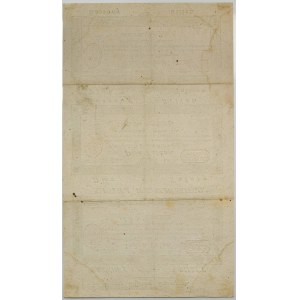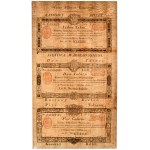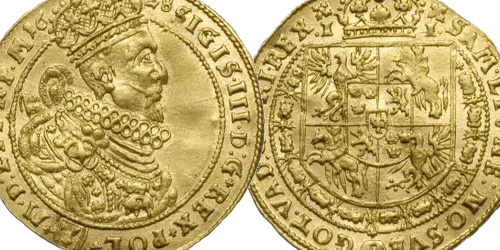Excellent position. An uncut sheet on which patterns of all denominations of Cash Tickets of the Duchy of Warsaw were printed together.
Variant with a reverse without the text of the decree on the reverse, printed on handmade ribbed paper with a watermark in the form of horizontal and vertical lines.
Typical fractures in the places of folding, as this sheet was attached to the royal decree of December 1, 1810. The remaining area of the sheet is perfectly preserved, with no significant defects.
The highly contrasting print attracts attention, which gives the entire sheet an unique appearance.
A copy without any traces of any corrections, absolutely natural and fresh. "Local" discolorations typical of this emission.
Dimensions: 31 cm x 18.1 cm
A high-class object, because the patterns of thalers of the Duchy of Warsaw usually appear in the form of already cut into single denomination pieces. The uncut sheet is included in our offer for the first time, which, combined with its excellent condition, allows us to say with great certainty that it is missing from many advanced collections. Beautiful and rare item!
The Duchy of Warsaw was created by the Treaty of Tilsit in 1807. By decree of the King of Saxony and Prince of Warsaw, Frederick Augustus, of December 1, 1810, paper money was introduced - cash tickets of the Duchy of Warsaw. These were in denominations of 1, 2 and 5 thalers. When exchanging paper money for metallic money, a commission of 2.22% of the value was charged. Therefore, box office tickets were not trusted by the population. Additionally, a maximum of half of the amount of taxes could be paid with paper money.
The graphic design referred to the circulating paper money issued in the Kingdom of Saxony at that time. These were one-sided rectangular prints characterized by a composition enclosed by an ornamental frame topped with the coat of arms of the Duchy at the top.
In 1812, the Duchy of Warsaw was occupied by Russian troops. When fleeing from Warsaw, the Government of the Duchy took with it paper money, which was burned in Krakow. In 1815, the Central Liquidation Commission was established to collect paper thalers from the population. Box office tickets were stamped on the reverse with an oblong stamp. However, they were never redeemed.




















![5 thalers 1810 - Ostrowski - 3-digit number [259].](https://img1.one.bid/img/4176/2584181_1x.jpg?1754863200)
![5 thalers 1810 - Ostrowski - 3-digit number [259].](https://img1.one.bid/img/4176/2584181_2x.jpg?1754863200)




